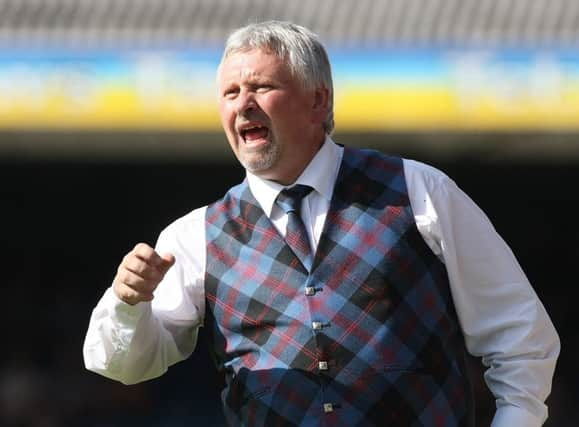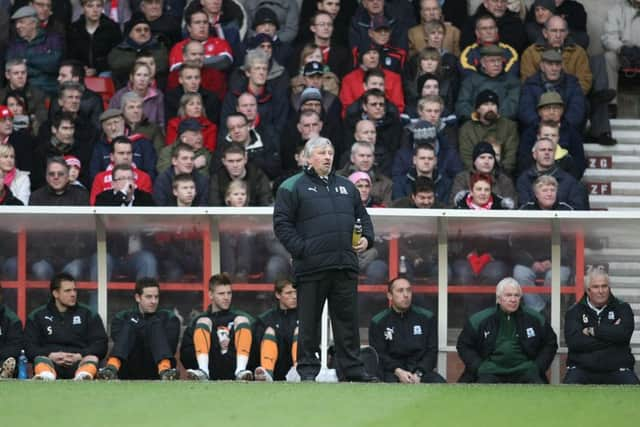Paul Sturrock: Transforming Yeovil could be last job


In this week of all weeks, Yeovil slipped to the bottom of the English football league (they were in the Championship as recently as 2013/14). However, Paul Sturrock doesn’t sound overly worried, explaining there are reasons for the poor form, injuries mostly, as well as budgetary constraints.
The ever frank Sturrock also blamed himself for defeat on Tuesday night to Wycombe Wanderers, which, combined with Dagenham and Redbridge’s surprise win at AFC Wimbledon, deposited Yeovil at the bottom of the pile of English clubs. Afterwards he lamented sticking with the team that drew with Newport last weekend.
Advertisement
Hide AdAdvertisement
Hide AdSturrock is always open and honest, as he is with fans on internet forums – the Yeovil one is called Ciderspace, quite brilliantly, where he posts under the very un-coded user handle “Paul Whitehead Sturrock” (his full name). But for the interviewer who has travelled almost the length of Britain, there is a worry.


It is that by the time you begin the task of picking over his words he will have been invited to return to an idyllic existence in the Cornish village of Menheniot on a permanent basis. It has happened before, in the same part of the world too, when an interview appointment with Exeter City’s Scottish manager Neil McNabb turned into his last press duty as manager there.
Some even wonder if the eagerly awaited meeting between Luggy and Jackie, two former United managers together, on 2 January, when McNamara’s second bottom York travel to face Yeovil, will go on without one of them – or even both, given York’s poor run of results. For the time being, Sturrock, whose team lost 2-0 at Northampton Town on Saturday, is looking forward to offering McNamara a new year drink in the office he has naturally painted tangerine.
“I am a realist,” he says. “When fans turn and shout into the directors’ box instead of at me, it is a dangerous time. The chairman gets stick and they don’t like it, no one likes criticism. At the end of the day I’ve had stranger sackings.”
He is based an hour and half’s drive away in Cornwall, where he lives with Andrea, his partner of four years. “Seven ponies, stables, an outside kitchen, pool table, jukebox, bar, orchard and my own vegetable plot,” explains Sturrock, of the new life he has built with Andrea, following the break-up to his long marriage to Barbara.
“That’s the life I am going to go back to. I am going to take up cricket again – I played at the start of the season and scored 17 runs for my team.”
Now in his 60th year, it’s not hard to wonder why he is putting himself through another tough shift, particularly since, for the last 16 years, he has been managing Parkinson’s disease, as well as a variety of sides, from Plymouth to Sheffield. “I am not winding down,” he insists. Sturrock looks well thanks to the right combination of tablets – perhaps as well as he has done in years.
“It could be my last job,” he continues. “I still feel I have advice to give to somebody. I want to do clinics for coaches too.”
Advertisement
Hide AdAdvertisement
Hide Ad“But I want to transform Yeovil like I have transformed nearly every club I have been at,” he adds. “I don’t like failure. Dundee United irked me because I did leave something half-finished.”
The sad end of his marriage with Barbara, who was on board with the plan to eventually return to their Scottish homeland, has meant Sturrock’s semi-retirement plans have had to alter. He has shelved a long-held ambition to return to manage at one of the Angus clubs, Forfar Athletic preferably – although Dick Campbell, Scotland’s longest serving manager, might have had something to say about this in any case.
His future intentions have been forced to change quite dramatically in a geographical sense although he still intends to work at another club. Sturrock accepts it won’t be at the same standard as a Forfar. “Saltash, Bodmin or Truro,” he says. “A team where I can keep my hand in.”
His relationship with Andrea means his roots have extended deeper into the Cornish sod; it is difficult to see him ever coming back. He has learned that dreams are sometimes better left as only dreams. He regrets managing Dundee United, the club for whom he starred throughout the 1980s, for a start, as well as returning for a second stint at Plymouth that was never going to live up to his first spell there, when he led them to the brink of the Championship. “I knew very early on that I couldn’t manage the team I supported. But I did, stupidly. They [United] were going to get relegated if I hadn’t gone back. Wee Jim [McLean] panicked and wanted me to bring foreigners in, like they had done with Tommy [McLean].
“But I had brought youngsters in and with them and Billy Dodds in the team, we were third top. Wee Jim recommended that we take the money [for Dodds, from Rangers], and we finished eighth!
“It wasn’t a disaster but I didn’t enjoy it,” he adds, of his time back at Tannadice. “I took it much too seriously. I was still living in Lochee at the time, and couldn’t get away. Working in Perth [at St Johnstone] was ideal – I could drive there and drive back. At the end of the day, walking out was the best thing I’d done. “I said to Wee Jim, ‘I don’t enjoy coming to my work, it is time’. He took two days trying to talk me round. But I’d had enough.”
He can be impulsive, reaching decisions quickly and with little regard to how it might be perceived, like at Southampton, when he walked out only two games into a Premier League season.
“I’ve been to the show,” he shrugs. “It would never have worked. The chairman [Rupert Lowe] was too hands on. A couple of the players and me did not see eye to eye. The coaches were very much the chairman’s men.
Advertisement
Hide AdAdvertisement
Hide Ad“It was a recipe for disaster. But I still had a good winning percentage and I loved every minute.
“I think Rupert thought I was an easy touch, that I’d be happy to do whatever I was told. After my first day, he got well ‘telt’.”
No-one should ever make the mistake of playing Sturrock for a fool. In his new autobiography Luggy, the follow-up to 1989’s Forward Thinking, he chronicles an upbringing in Pitlochry that sounds chaotic. He needed to be independent when his mother left home for the north of England, taking his sister with her. A 15 year-old Sturrock combined trying to forge a career at United under Jim McLean while also looking after George, his father.
“I went to Dundee United, he went to rack and ruin,” he explains. “He wasn’t paying the bills. I paid the bills, did all the cleaning from top to bottom in the bed and breakfast. I did that when I was 15 – I basically ran a bed and breakfast place myself, in Pitlochry.
“When I came back from United after three or four months, he had not paid any of the bills. There was no light in the house, he was cutting up furniture for the fire so he could cook something. That is how bad he got.”
It says everything that Sturrock was able to make the most of himself at United, perhaps gaining from McLean the discipline lacking at home, although it was of course to the other extreme.
Whatever McLean’s faults, Sturrock credits him with making sure he was able to bring out the best of himself, to the extent that he was good enough to become Kenny Dalglish’s understudy for Scotland, for all the good this did him.
“We were walking back from a training ground, and I remember Jock Stein put his arm round me and said: ‘Paul, I watched you a couple of weeks ago and you were terrific, you have trained really well again and I am really pleased with your progress. Just remember one thing, when Kenny is injured you will play.’
“He got 102 caps, I got 20.”
Advertisement
Hide AdAdvertisement
Hide AdSturrock was at two World Cups, but played in only one – 1986. He was cruelly denied an appearance four years earlier in Spain, against Brazil. “When you re told to go and get warmed up, you expect to get called back and on you go,” he says. “The next minute I looked down the line and Kenny was coming on.”
But these are complaints from another time, another life almost, considering how much it has changed, personally as well as professionally. He speaks enthusiastically about baking skills he suspects were passed down from his father, who was a head baker at Fisher’s Hotel in Pitlochry prior to becoming a railway signalman and before finally falling off the tracks.
Like with the muffins Sturrock has now perfected, he needs to find the ingredients to get Yeovil rising again. On the long journey back from Somerset, as the train flashes through picturesque market towns like Sherborne that seem a long way from Sturrock’s spiritual homeland in Dundee, you figure that, somehow, he will.